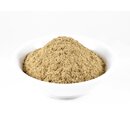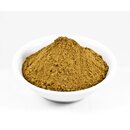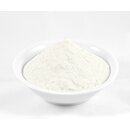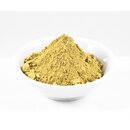Magnesium chloride pharmacopoeia quality, Ph.Eur.
Fine crystalline, bioavailable, 99.9% pure, internally and externally
For the production of magnesium oil or for foot) baths (6 g to 4 liters of lukewarm water)
Magnesium chloride can be applied externally as magnesium oil or taken in with water.
It controls and activates over 300 enzymes.
What is the highest concentration of magnesium chloride dissolved in water?
Approximately 60% of the population have a magnesium deficiency.
According to Dr. Sircus, 700 mg or more magnesium a day is recommended.
This requires 700 x 8.47 = 5.93 g magnesium chloride.
Since magnesium chloride dissolves well in water, the concentration can be produced in any desired strength.
How do I calculate the magnesium content for magnesium oil?
Magnesium chloride contains 11.8% pure magnesium, the rest is chlorine.
Usually it is recommended to use approx. 30 g magnesium chloride in 1 liter of water. This corresponds to approx. 3% magnesium chloride solution, which is called magnesium oil because it has an oily effect on the skin. This solution contains approx. 3.5 g of pure magnesium. If this amount is dissolved in 1 liter (1000 ml) of water, 1 ml of it contains 3.% mg magnesium.
How to notice magnesium deficiency?
10 indications to watch out for
Do you have muscle cramps, facial twitches, sleep disorders or chronic pain?
Then read on, it's worth making sure you get enough magnesium.
Less than 30% of adults in the West receive the recommended daily dose of magnesium.
And almost 20% only get half of the magnesium they need.
Let your bood be tested in a laboratory for its magnesium content as magnesium is present in the blood cells.
But you can also answer a few questions about your lifestyle and pay attention to signs and signals of low magnesium levels.
1. Do you regularly drink carbonated water or soda pops?
Most dark colored soda contains phosphates. These substances actually connect with magnesium in the digestive tract and make it inaccessible to the body. So even if you eat a balanced diet, by drinking soda with your meals, you will flush magnesium out of your system.
This can be responsible for both the reduced magnesium and calcium availability in the body.
2. Do you regularly eat pastries, cakes, desserts, sweets or other sugar containig food?
Refined sugar is not only a zero magnesium product, it also causes the body to excrete magnesium through the kidneys. When refined sugar is made from sugar cane, the molasses is removed and the magnesium content is completely removed. That is why it is good to take molasses as a sweetener.
And sugar does not only lower the magnesium level. Nutritionists call sweet foods ?anti-nutrients?. Anti-nutrients like candy are foods that replace whole nutritious foods in the diet, but actually absorb nutrients during digestion, resulting in a net loss. Since all foods need vitamins and minerals to boost the digestive process, it is important to choose foods that "defer" essential nutrients, and then some.
The more sweet foods and processed baked goods you have in your diet, the more likely you are to be deficient in magnesium and other vital nutrients.
3. Have you had a lot of stress in your life, or have you recently had a major medical procedure such as surgery?
Stress can be a cause of magnesium deficiency, and a lack of magnesium tends to exacerbate the stress response and make the problem worse. Studies have linked adrenaline and cortisol, by-products of the "fight or flight response" associated with stress and anxiety, to decreased magnesium levels
As stressful conditions require more magnesium consumption by the body, all of these conditions can lead to deficiency, including psychological and physical forms of pressure such as surgery, burns, and chronic illnesses.
4. Do you drink coffee, tea or other caffeinated drinks every day?
The body's magnesium levels are largely controlled by the kidneys, which filter and excrete excess magnesium and other minerals. But caffeine causes the kidneys to release extra magnesium regardless of body condition. If you regularly drink caffeinated drinks like coffee, tea and soda, your risk of magnesium deficiency increases.
Maybe you want to change to cocoa, preferably non-roasted sugar free raw cocoa. Cocoa provides magnesium among other valuable secondary plant substances, the flavonoids epicatechin and procyanidin, which are contained in large quantities in the seeds (beans). Only few people know that organic cocoa is healthy, good for the brain, as research from the Universities of Düsseldorf and Witten-Herdecke has shown.
5. Are you on a diuretic, heart medication, asthma medication, birth control pills or estrogen replacement therapy?
The effects of certain medications have shown that they lower magnesium levels in the body by increasing magnesium loss through excretion through the kidneys.
6. Do you drink more than seven alcoholic beverages a week?
The effect of alcohol on magnesium levels is comparable to the effects of diuretics: it lowers the magnesium available to the cells by increasing the excretion of magnesium through the kidneys. Studies have found clinical magnesium deficiency in 30% of alcoholics.
Increased alcohol consumption also contributes to decreased digestive system performance and vitamin D deficiency, both of which can contribute to low magnesium levels.
7. Are you taking calcium supplements without magnesium or calcium supplements with magnesium in a ratio of less than 1: 1?
While a calcium supplement can have negative effects on magnesium levels, a magnesium supplement improves the body's calcium consumption. Although many reports suggest taking calcium to magnesium in a 2: 1 ratio, this number is largely arbitrary. The ideal ratio for each individual varies depending on current conditions and the risk factors for a deficiency.
However, several researchers are now supporting a 1: 1 calcium-magnesium ratio for improved bone support and a lower risk of disease. This is not only due to the increased evidence of a widespread magnesium deficiency, but also to concerns about the risk of arterial calcification when low magnesium stores are coupled with high calcium intake.
Please be aware that it is usually NOT necessary to take additional calcium if you eat a lot of dairy products like joghurt and cheese. The harder the cheese the more calcium it provides.
| Shipping weight: | 0,10 Kg |
| Product weight: | 0,10 Kg |
| Contents: | 100,00 g |








